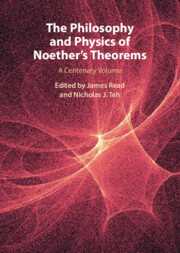Book contents
- Frontmatter
- Contents
- Contributors
- Introduction
- 1 The Noether Theorems in Context
- 2 Felix Klein and Emmy Noether on Invariant Theory and Variational Principles
- 3 Moscow, Oxford, or Princeton: Emmy Noether’s Move from Göttingen (1933)
- 4 Getting to the Bottom of Noether’s Theorem
- 5 BV Quantisation in Perturbative Algebraic QFT: Fundamental Concepts and Perspectives
- 6 Divergence Invariant Variational Problems
- 7 Do Symmetries ‘Explain’ Conservation Laws? The Modern Converse Noether Theorem vs Pragmatism
- 8 Noether’s First Theorem and the Energy-Momentum Tensor Ambiguity Problem
- 9 Noether’s Theorems and Energy in General Relativity
- 10 Geometric Objects and Perspectivalism
- 11 Substantive General Covariance and the Einstein–Klein Dispute: A Noetherian Approach
- 12 Noether Charges, Gauge-Invariance, and Non-Separability
- 13 Observability, Redundancy, and Modality for Dynamical Symmetry Transformations
- 14 The Gauge Argument: A Noether Reason
- Index
8 - Noether’s First Theorem and the Energy-Momentum Tensor Ambiguity Problem
Published online by Cambridge University Press: 22 September 2022
- Frontmatter
- Contents
- Contributors
- Introduction
- 1 The Noether Theorems in Context
- 2 Felix Klein and Emmy Noether on Invariant Theory and Variational Principles
- 3 Moscow, Oxford, or Princeton: Emmy Noether’s Move from Göttingen (1933)
- 4 Getting to the Bottom of Noether’s Theorem
- 5 BV Quantisation in Perturbative Algebraic QFT: Fundamental Concepts and Perspectives
- 6 Divergence Invariant Variational Problems
- 7 Do Symmetries ‘Explain’ Conservation Laws? The Modern Converse Noether Theorem vs Pragmatism
- 8 Noether’s First Theorem and the Energy-Momentum Tensor Ambiguity Problem
- 9 Noether’s Theorems and Energy in General Relativity
- 10 Geometric Objects and Perspectivalism
- 11 Substantive General Covariance and the Einstein–Klein Dispute: A Noetherian Approach
- 12 Noether Charges, Gauge-Invariance, and Non-Separability
- 13 Observability, Redundancy, and Modality for Dynamical Symmetry Transformations
- 14 The Gauge Argument: A Noether Reason
- Index
Summary
Using the converse of Noether’s first theorem, this chapter shows that the Bessel-Hagen-type transformations are uniquely selected in the case of electrodynamics, which powerfully dissolves the methodological ambiguity at hand. It then considers how this line of argument applies to a variety of other cases, including in particular the challenge of defining an energy-momentum tensor for the gravitational field in linearised gravity. Finally, the search for proper Noether energy-momentum tensors is put into context with recent claims that Noether’s theorem and its converse make statements on equivalence classes of symmetries and conservation laws. The aim is to identify clearly the limitations of this latter move, and to develop this position by contrast with recent philosophical discussions about how symmetries relate to the representational capacities of theories.
- Type
- Chapter
- Information
- The Philosophy and Physics of Noether's TheoremsA Centenary Volume, pp. 169 - 196Publisher: Cambridge University PressPrint publication year: 2022
- 3
- Cited by

